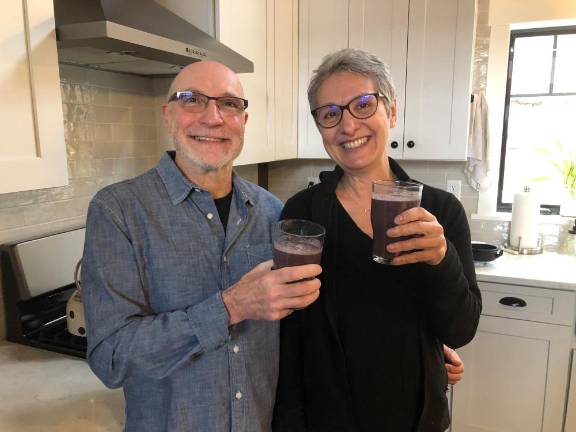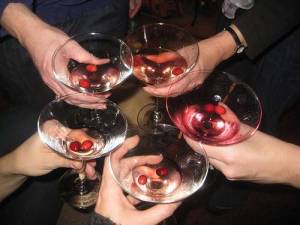A month without booze? Locals give it a shot
Drinking. For many, Dry January is a chance to reset or cut back after a marathon of holiday-induced indulgence, when there’s a lot to celebrate — and eat, and drink. Local participants say taking a break to evaluate your relationship with alcohol yields immediate good results.


Retired school counselor Kerri Yezuit knows how to keep a New Year’s resolution. She quit smoking cold turkey on Jan. 1, 2015, and never looked back.
The Vernon resident first heard about Dry January in 2020 while watching the news. The challenge piqued her interest. Like many others, her alcohol consumption increased with the onset of the Covid-19 pandemic. Zoom happy hours were the norm, and her typical glass of wine with dinner crept up to two or three.
“It was a release from the anxiety of Covid that many people, including myself, were indulging in,” said Yezuit. “So I went along for the ride. And then I was like – wait a second – this is not a good habit.”
To reevaluate her relationship with alcohol, Yezuit tried Dry January for the first time in 2021. She was successful – except for one blip.
“January 6th happened and I fell off the wagon, as the old saying goes,” said Yezuit. “When that event occurred in our Congress, I was like, ‘Uh, forget about it.’”
Aside from that, Yezuit finished the month alcohol free. And she’s back at it again this year: just 19 days into 2022, Yezuit reported that she was sleeping better, was more productive throughout the day, and was feeling more creative.
But is ditching booze for the month of January really enough to make a difference mentally or physically?
Local health professionals say there’s nothing unhealthy about the challenge — and examining one’s relationship with alcohol has its benefits.
“It’s certainly not harmful,” said Dr. Bob DeYoung, a licensed counselor based in Milford, Pa. “The only people it’s harmful to are the poor bar owners who have already been whacked with the Covid restrictions. So it’s harmful to them, but to the person actually doing the Dry January thing – I don’t see any harm in it. It’s almost like hitting a magic reset button.”
Six weeks of holiday cheers
For many, Dry January is a chance to reset or cut back after a marathon of holiday-induced indulgence: Thanksgiving Eve, Thanksgiving Day, office parties, Christmas, holidays with the in-laws, New Year’s. There’s a lot to celebrate — and eat, and drink.
And, according to Jodina Brizell, a licensed drug and alcohol counselor at Lakeside Counseling in Newton, N.J., that period of time is enough to notice a difference.
“When you go through a period of heavy drinking – heavy drinking being just drinking more frequently than you normally would over a short period of time – it’s going to have adverse affects on your body,” said Brizell. “It’s going to cause sleep disturbance or sleeping issues. It’s not healthy for your body, which in turn is not going to be healthy for any other parts of you, from a mental health perspective.”
Even small amounts of alcohol can disrupt one’s sleep pattern. According to a 2018 study, those who consumed fewer than two drinks per day experienced a decreased sleep quality by 9%. Moderate drinkers, classified as two drinks for men, and one drink for women, saw a 24% decrease in quality of sleep. And for those who drank more – over one serving for women and over two servings for men – quality of sleep decreased by over 39%.
Improved sleep was the first thing both Yezuit and Warwick, N.Y. resident Colleen Kelly mentioned about the benefits of cutting alcohol for the month.
“You sleep better, number one,” said Kelly. “I definitely notice, literally after the first week, my sleep is better.”
Worth the weight?
For some, cutting back on alcohol results in weight loss.
Kelly, a fashion CEO and life coach, also focuses on eating healthier during January. While weight loss isn’t the ultimate goal, it’s “a good side thing,” she said.
Cutting alcohol’s empty calories alone probably isn’t enough to see a difference on the scale, said Suzanne K. Meier, a registered dietician for Crystal Run Healthcare in Middletown, N.Y. But cutting back on drinking does have a ripple effect that can affect one’s weight.
“One of the things that alcohol does is lower your barriers, if you will,” explained Meier. “So people may tend to eat more when they’re drinking more.”
Mindful drinking
Kelly’s first Dry January foray was part of a cleanse she and her husband did ten years ago. They eliminated various food groups, but Kelly found that cutting alcohol was the hardest part. Now, they participate every year “to take a break,” she said. “It sort of refreshes your relationship with alcohol.”
Yezuit, too, uses the month for a mindful reset. “For me, I’m just doing an evaluation of what my relationship is with alcohol,” she said. “Is it a bad habit? Is it something I use to reward myself? Is it something I use to suppress uncomfortable feelings?”
With a laugh, she added, “I’d say yes to all of that. So I appreciate the opportunity for what I would call a reset.”
Taking that pause for self-evaluation can be beneficial.
“You start to become aware of when you drink, how you drink, where you drink, and what effects it’s having on you,” said Dr. Michael Wright, a licensed psychotherapist in Milford, Pa. “And that’s a good thing for for anybody.”
Brizell said it is “never a bad thing to look at our habits, and look at how they may be affecting our daily existence.”
Temptation
To make it through the month successfully, both Kelly and Yezuit find other things to focus on. Kelly replaces her regular glass of wine with a glass of sparkling water or kombucha while she’s cooking. Yezuit connects with family and her pets in the evening. They both, admittedly, avoid social events – which is fairly easy, between the cold weather and the pandemic.
DeYoung, the counselor, recommends picking up an interesting hobby to replace the habit. “Don’t drink – then what?” he said. “All right, let’s exercise. Or, let me replace this with fill-in-the-blank, whatever it is: I’m going to learn a new language, I’m going to eat better.”
He said some people are pleasantly surprised and say, “Wow, it’s been a whole month now, I haven’t drank alcohol, I’m starting to hablo español! Or I started working out, and I like this – this feels better.”
Effects
Kelly and Yezuit both plan to move into February, and the rest of the year, with a more mindful approach toward drinking: consuming less, less habitually.
Practicing Dry January can have lasting effects. According to a 2019 study by the University of Sussex, Dry January participants were still drinking less six months later, and:
● 87% had a sense of achievement
● 80% felt more in control of their drinking
● 84% saved money
● 72% slept better
In a survey of local readers, more than 130 said they were giving Dry January a shot this year, or have tried in the past.
But local liquor stores aren’t stocking up on mocktails just yet. Greenwood Lake Liquors owner Jim Aiello said the trend doesn’t affect business sales or operations.
He does hear about Dry January from a handful customers when they return the following month.
And he sees some sooner than others. He said, “I’ll have someone who jumped off the wagon because they had a stressful day and will come in and say: ‘Ah, I’m supposed to be on Dry January.’”
“I’m just doing an evaluation of what my relationship is with alcohol. Is it a bad habit? Is it something I use to reward myself? Is it something I use to suppress uncomfortable feelings?” Kerri Yezuit


